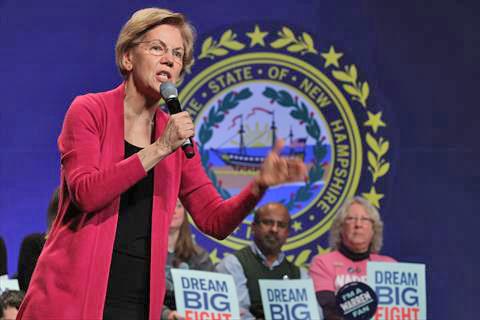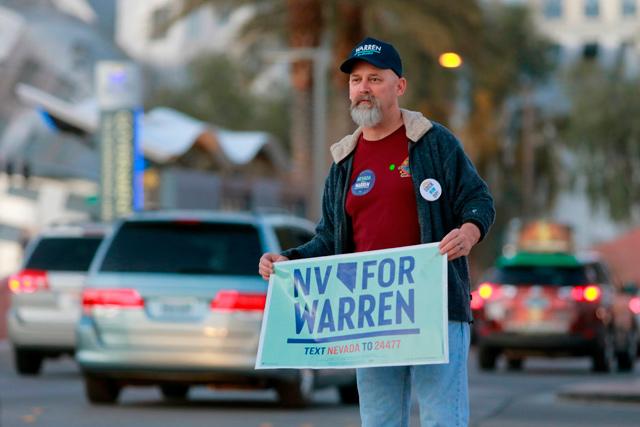You are here
US leftists believe tide is turning ahead of election
By AFP - Feb 06,2020 - Last updated at Feb 06,2020
NEW YORK — With self-described socialist Bernie Sanders and progressive flag-bearer Elizabeth Warren earning podium places in the Iowa caucuses, the leftist wing of the US Democratic Party is feeling unusually bullish.
The Iowa vote is an early test of popularity in the battle to become the Democratic candidate who takes on President Donald Trump in November's election.
Leftist politics have long been marginalised in the United States, but a new generation of young and often disgruntled voters is questioning the country's longtime ethos of rampant capitalism and "trickle-down" economics.
Pete Buttigieg — a moderate Democrat seen as business-friendly — and Sanders finished in a virtual dead heat for first place in Iowa.
Sanders is a fiercely independent senator who has spent years demanding high taxes on the rich, a far higher minimum wage, European-style social security and free universities.
And behind Sanders came Warren, who relentlessly attacks energy giants, health insurance companies, the gun industry and officials beholden to lobbyists — everyone she accuses of enriching themselves on the back of workers.
Latest partial results from Iowa put Buttigieg on 26.2 per cent, Sanders on 26.1 per cent and Warren on 18.2 per cent — with centrist Joe Biden shunted back in a weak fourth.
The burgeoning sense of hope among the often-scorned American left "reflects a gradual movement within the party over several years", Costas Panagopoulos, professor of Political Science at Northeastern University, told AFP.
Hunger for 'big changes'
Although Sanders eventually lost the 2016 nomination race to Hillary Clinton, "the ideas he was espousing were clearly penetrating the consciousness of the electorate", Panagopoulos said.
"Many voters are dissatisfied with their economic circumstances and they believe... that big changes are necessary."
According to Pew Research, back in 2000, 27 percent of Democrats said they were liberal or very liberal. By 2019, the figure had risen to 47 per cent.
The anti-capitalist Occupy Wall Street movement that emerged in 2011 and organising months of large protests was one visible sign of developments.
Another was the legislative elections in 2018 that carried candidates on the left of the party such as Alexandria Ocasio-Cortez to office — often at the expense of more moderate figures.
The sea change echoed the rightwards drift of the Republican Party in the early 2000s under the influence of the Tea Party movement, said David Barker, professor at American University.
"I am 50 and when I hear the word 'socialism' I still think of the Soviet Union... but my students, they think of Norway and Scandinavia," he said.
"The cold war dynamics are old history to them."
The shift to the left has been fueled by demographic change as Democrats are now younger, more educated and more ideological, Barker said.
In the nomination contest to challenge Trump, even today's "moderates" Buttigieg and Biden are actually to the left of Democrats such as Bill and Hillary Clinton, he added.
"There is going to be one candidate of the left and one of the centre, and they are going to battle it out."
The Trump effect
Trump's shock election in 2016 also reflects growing polarisation in politics — with both Republicans and Democrats staking out more extreme positions rather than seeking the once-treasured "middle ground".
Under Trump "the pendulum has swung so far to the other side, what we might have considered radical four years ago is less so now", said Dawn Shurmaitis, a 61-year-old New Jersey voter who campaigned for both Barack Obama and Hillary Clinton.
Some analysts see similarities between Sanders and Trump in their unfiltered way of speaking.
Sanders, like Trump in 2016, is viewed as "more authentic, less processed", said Jim Campbell, of the University of Buffalo.
"There is that attraction, and the sort of populism that they both have as outsiders of their own party."
The president has gleefully seized on the party's leftward shift to tar the Democrats as "radical socialists" — attacking Sanders himself as a communist.
But the moderates are far from defeated, with Biden pushing for a comeback and billionaire Michael Bloomberg — who sat out Iowa — plotting to take center stage among the challengers. Buttigieg is strong, too.
The tight contest is expected to go right up until the Democratic convention in July confirms the party's final choice — who must then beat the formidable Trump.
"There is still a long, long way to go,” said Campbell."This is the first round."
Related Articles
MANCHESTER, United States — Bernie Sanders and Pete Buttigieg carried their fight for the Democratic presidential nomination to the nat
WASHINGTON, United States — Democratic candidates were anxiously awaiting results from the Iowa caucuses on Tuesday after technical glitches
WASHINGTON — From glitzy Las Vegas casinos to dusty desert crossroads, Nevada Democrats vote on Saturday for who should challenge President


















